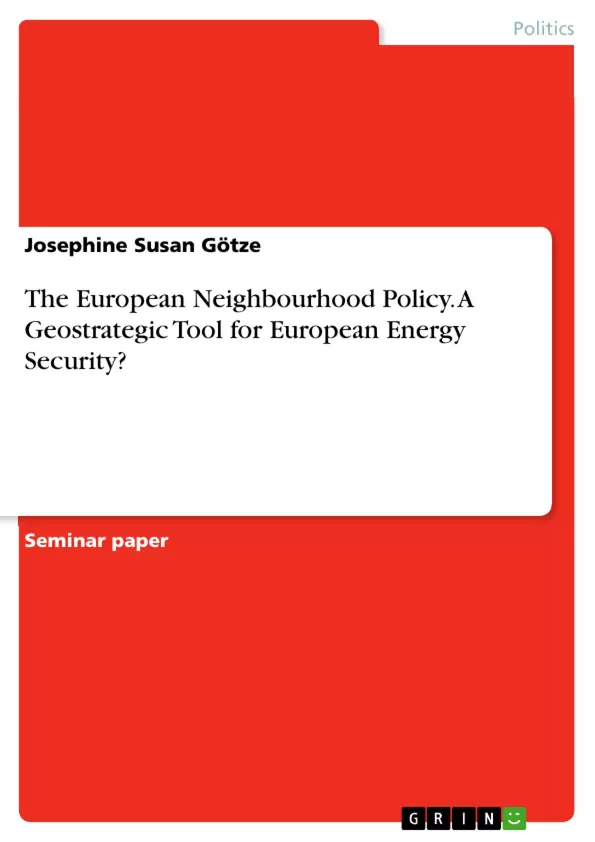The European Union (EU) has an increasing demand for energy, which is the basis for its economy and the prosperity of its citizens. Given the fact that the Union itself does not have the necessary resources at its disposal, it is dependent on other resource exporting countries – especially Russia. To become more independent from those countries, the EU follows a strategy of diversification of energy supplies and market liberalisation.
In this context, the European Neighbourhood Policy (ENP), bringing together the EU and 16 of its Eastern and Southern neighbouring states, plays a significant role. But the rapprochement between the EU and its neighbours is problematic regarding relations with Russia, which see its interests in its traditional zone of influence threatened. Given the high dependence of European (and ENP) states on Russian gas, Russia was traditionally able to use energy deliveries (or rather their non-delivery) as a geostrategic tool to push through its interests. With the ENP, which enables the coordination of deliveries and pipeline projects with energy transit countries, the EU has developed a geostrategic tool to potentially reduce the Russian influence on deliveries.
Against the background of relations between the EU and Russia being characterised by non-static mutual interdependence, (geopolitical) strategies can be used to change the power relations between states in favour of one actor or another. In this context, the aim of this paper is first, to elaborate on the geostrategic functioning of the ENP and second, to evaluate the value of the ENP for European Energy Security focusing on the Eastern Partnership and the resulting changes in the energy relations between the EU, its neighbours and Russia, to finally be able to give an answer to the question "To what extent does the ENP serve the EU as a geostrategic instrument to improve its energy security?". In the analysis, the European as well as the Russian standpoint will be considered to be able to reveal strengths and weaknesses of the ENP-strategy.
Inhaltsverzeichnis (Table of Contents)
- INTRODUCTION
- THEORY AND METHOD
- EUROPEAN NEIGHBOURHOOD POLICY
- ENERGY SECURITY OF THE EUROPEAN UNION AND THE ROLE OF RUSSIA
- EUROPEAN NEIGHBOURHOOD POLICY AS A GEOSTRATEGY OF (ENERGY) SECURITY
- THE EUROPEAN PERSPECTIVE
- ENP and diversification of suppliers and energy supply routes
- ENP and pan-European Energy Community and market liberalisation
- THE RUSSIAN PERSPECTIVE
- Chances of fragmented European energy market and bilateral energy relations
- Looking east: Rising Asian demand for energy and the Eurasian Economic Union
- CONCLUSION
- LITERATURE
Zielsetzung und Themenschwerpunkte (Objectives and Key Themes)
This paper explores the geostrategic functioning of the European Neighbourhood Policy (ENP) and assesses its value for European Energy Security. The focus is on the Eastern Partnership and the resulting changes in energy relations between the EU, its neighbours, and Russia. The goal is to understand the extent to which the ENP serves as a geostrategic tool for enhancing the EU's energy security.
- The geostrategic rationale behind the ENP
- The role of the ENP in diversifying energy suppliers and routes
- The impact of the ENP on energy market liberalization in Europe
- The relationship between the ENP and Russian energy influence
- The potential for the ENP to enhance European energy security
Zusammenfassung der Kapitel (Chapter Summaries)
The introduction presents the context of the study, highlighting the EU's dependence on energy imports and its strategic objective of diversifying energy supplies. The paper then outlines the theoretical framework of geopolitics and the role of geographical entities in political action. The following sections delve into the European Neighbourhood Policy (ENP) and its significance in the context of energy security. The chapter explores the European and Russian perspectives on the ENP, examining the potential for the policy to influence energy relations between the EU, its neighbours, and Russia.
Schlüsselwörter (Keywords)
The key terms and concepts explored in this paper include: European Neighbourhood Policy, energy security, geopolitics, geostrategy, diversification of energy suppliers, market liberalization, European Energy Community, Eurasian Economic Union, Russia, Eastern Partnership, EU-Russia relations.
Frequently Asked Questions
What is the European Neighbourhood Policy (ENP)?
The ENP is a framework bringing together the EU and 16 neighbouring states to foster stability, security, and prosperity, particularly in the energy sector.
How does the ENP serve as a geostrategic tool?
It enables the EU to coordinate pipeline projects and energy deliveries with transit countries, potentially reducing Russian influence on European energy supplies.
Why is the EU dependent on Russian energy?
The EU lacks sufficient internal resources and relies heavily on Russian gas exports, which Russia has traditionally used as a geostrategic tool.
What is the goal of the Eastern Partnership?
It aims to deepen relations between the EU and its Eastern neighbours, focusing on energy security, market liberalization, and diversification of supply routes.
What is the Russian perspective on the ENP?
Russia often views the ENP as a threat to its traditional zone of influence and counters it through bilateral relations and the Eurasian Economic Union.
- Arbeit zitieren
- Josephine Susan Götze (Autor:in), 2017, The European Neighbourhood Policy. A Geostrategic Tool for European Energy Security?, München, GRIN Verlag, https://www.hausarbeiten.de/document/380665


